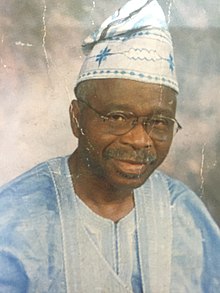A Yoruba leader and professor of statistics, Prof Biyi Afonja, on Sunday, advised President Muhammadu Buhari to convince Nigerians that he was not a religious and ethnic bigot.
Afonja who was also a commissioner for education in the old western region, appealed to the President to “do something concrete and convincing on employment, security and credibility of government.”
He said doing so would change the people who were accusing the President of executing ethnic and religious agenda against national interest.
The octogenarian who made the appeal while speaking on a live radio programme in Abeokuta tagged, ‘Sunday Morning Live on FM’ spoke on ‘Nigerian nation; 59 years on.’
The professor said, “On employment, security, credibility of government, ethnic and religious agenda, I am begging that for all the good things the President is doing, he should do something concrete and convincing to disabuse the minds of the people that are accusing him of ethnic and religious agenda.
“If he can try to do something to convince the people that he is not a religious bigot like they accused him of, this will make him a great statesman.”
The Yoruba leader commended the President on his doggedness towards the fight against corruption, submitting that Buhari was the only President who was truly committed to the fight against corruption.
The don, who argued that statistics could be used in combating corruption in the country, said corruption could only be minimised.
According to him, to wipe out corruption; the word ‘wipe out’ doesn’t arise because corruption is everywhere in the world, “we can only minimize it and that is what we are aiming at.”
He said, “But, the fact is that it is so deep into society, right from the clerk in the office to the highest level. So, it is all of us; you see someone do something wrong, speak out.
Speaking on 59 years independence of the country, the academician lamented that ethnic-bigotry had taken over many Nigerians and erased the spirit of nationalism which could be channeled towards the development of the country.
He said, “It is unfortunate that the average Nigerian sees himself or herself first as a Yoruba man or Igbo or Hausa before thinking that he is a Nigerian.”


